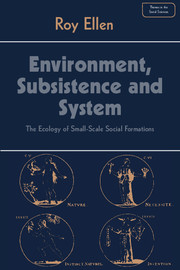Book contents
- Frontmatter
- Contents
- Preface
- Acknowledgements
- 1 ENVIRONMENTAL DETERMINISM AND CAUSAL CORRELATION
- 2 POSSIBILISM AND LIMITING FACTORS
- 3 CULTURAL ECOLOGY AND THE EXPLANATORY IMPERATIVE
- 4 HUMAN ECOLOGY AND THE BIOLOGICAL MODEL
- 5 THE FLOW OF ENERGY AND MATERIALS
- 6 ECOSYSTEMS AND SUBSISTENCE PATTERNS I
- 7 ECOSYSTEMS AND SUBSISTENCE PATTERNS II
- 8 SYSTEMS AND THEIR REGULATION
- 9 INFORMATION AND THE MANIPULATION OF THE ENVIRONMENT
- 10 ADAPTATION: A SUMMARY AND RECONSIDERATION
- 11 THE REPRODUCTION AND EVOLUTION OF SOCIAL AND ECOLOGICAL SYSTEMS
- 12 ECOLOGY IN ANTHROPOLOGICAL METHOD AND THEORY
- Notes
- Bibliography
- Name Index
- Subject Index
12 - ECOLOGY IN ANTHROPOLOGICAL METHOD AND THEORY
Published online by Cambridge University Press: 05 June 2012
- Frontmatter
- Contents
- Preface
- Acknowledgements
- 1 ENVIRONMENTAL DETERMINISM AND CAUSAL CORRELATION
- 2 POSSIBILISM AND LIMITING FACTORS
- 3 CULTURAL ECOLOGY AND THE EXPLANATORY IMPERATIVE
- 4 HUMAN ECOLOGY AND THE BIOLOGICAL MODEL
- 5 THE FLOW OF ENERGY AND MATERIALS
- 6 ECOSYSTEMS AND SUBSISTENCE PATTERNS I
- 7 ECOSYSTEMS AND SUBSISTENCE PATTERNS II
- 8 SYSTEMS AND THEIR REGULATION
- 9 INFORMATION AND THE MANIPULATION OF THE ENVIRONMENT
- 10 ADAPTATION: A SUMMARY AND RECONSIDERATION
- 11 THE REPRODUCTION AND EVOLUTION OF SOCIAL AND ECOLOGICAL SYSTEMS
- 12 ECOLOGY IN ANTHROPOLOGICAL METHOD AND THEORY
- Notes
- Bibliography
- Name Index
- Subject Index
Summary
ON EMPIRICAL CONTRIBUTIONS AND TECHNIQUES
I have had two interrelated aims in writing this book. The first has been to indicate that there is much to be salvaged from contradictory and otherwise singularly inadequate theoretical styles in the analysis of human environmental relations. Different styles and emphasis have arisen as understandable responses to dissatisfaction with earlier approaches, or the ideological implications of those approaches. It is often difficult to separate ideology from theory in social science. We find a repetition (a re-cycling) of old debates and ideas. These, to a large degree, reflect ideology. But at the same time there is a cumulative growth in a body of knowledge and assumptions which prevents the formulation of old debates in precisely the same terms. This is science, and attempts to separate it from ideology mark some kind of movement towards the claim of a discipline to be scientific.
The second aim has been to show the ways in which particular techniques and concepts can be used to advantage in the analysis of human subsistence. At a purely empirical level, recent ecological research conducted in this field has furnished new and detailed data for the analysis of productive processes. In the first place, it has led to new ways of looking at the relations between different sets of information and the employment of different descriptive categories, giving rise to new and hitherto unperceived problems and relationships.
- Type
- Chapter
- Information
- Environment, Subsistence and SystemThe Ecology of Small-Scale Social Formations, pp. 274 - 279Publisher: Cambridge University PressPrint publication year: 1982

